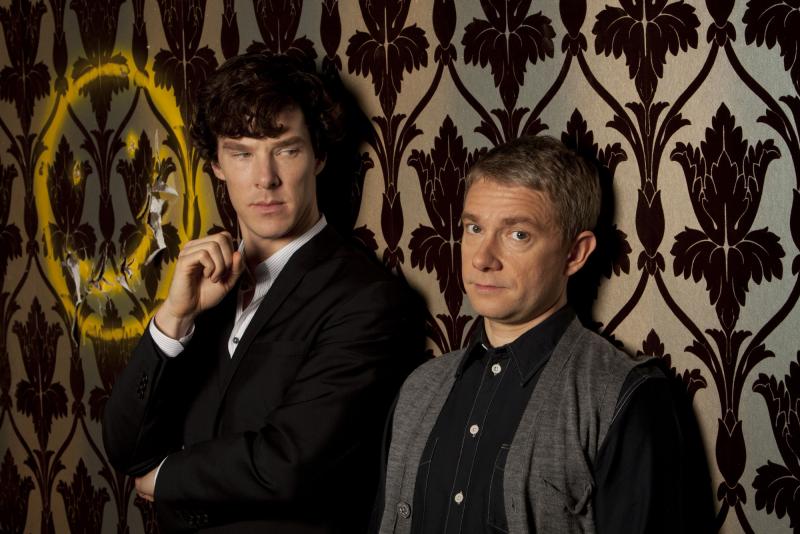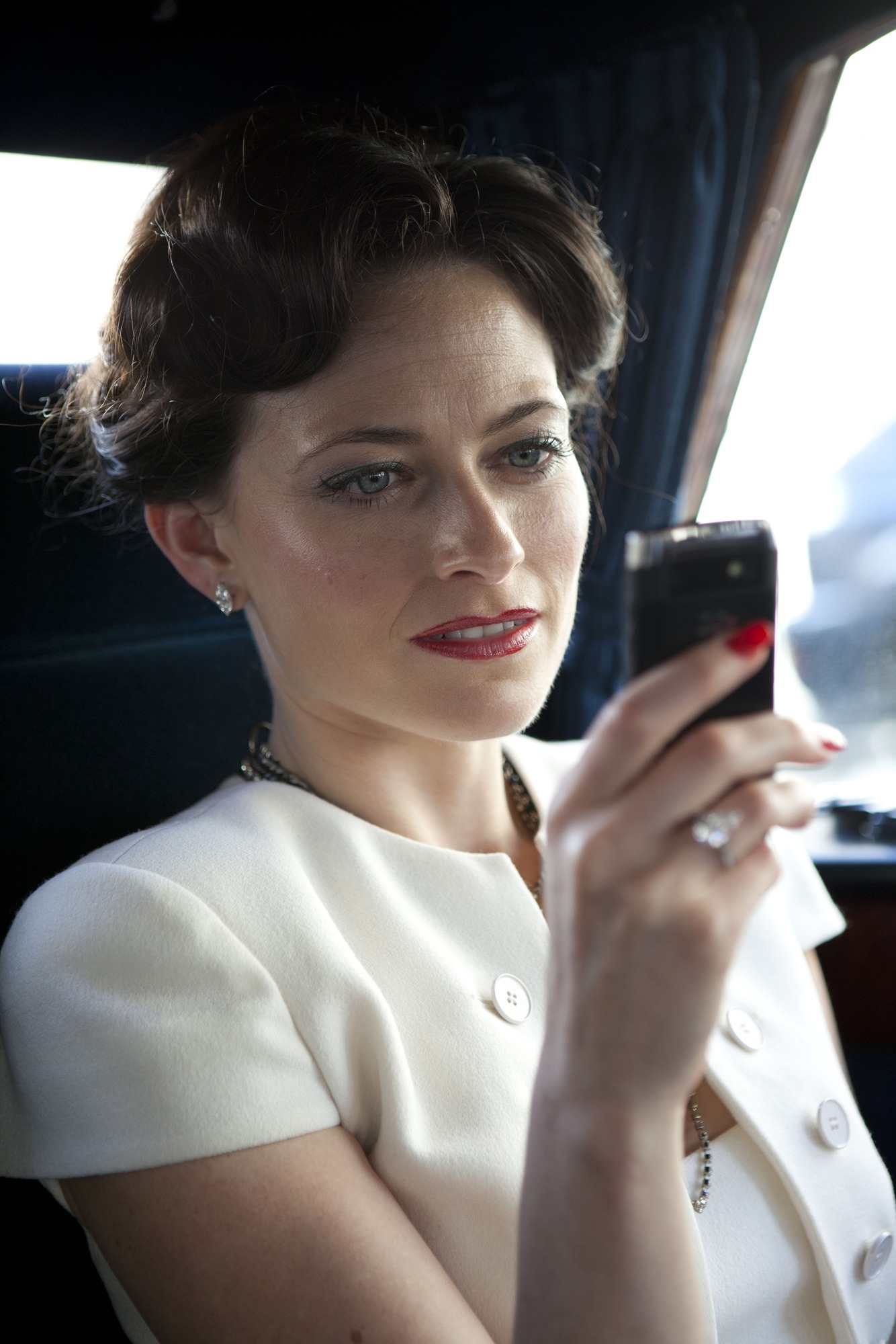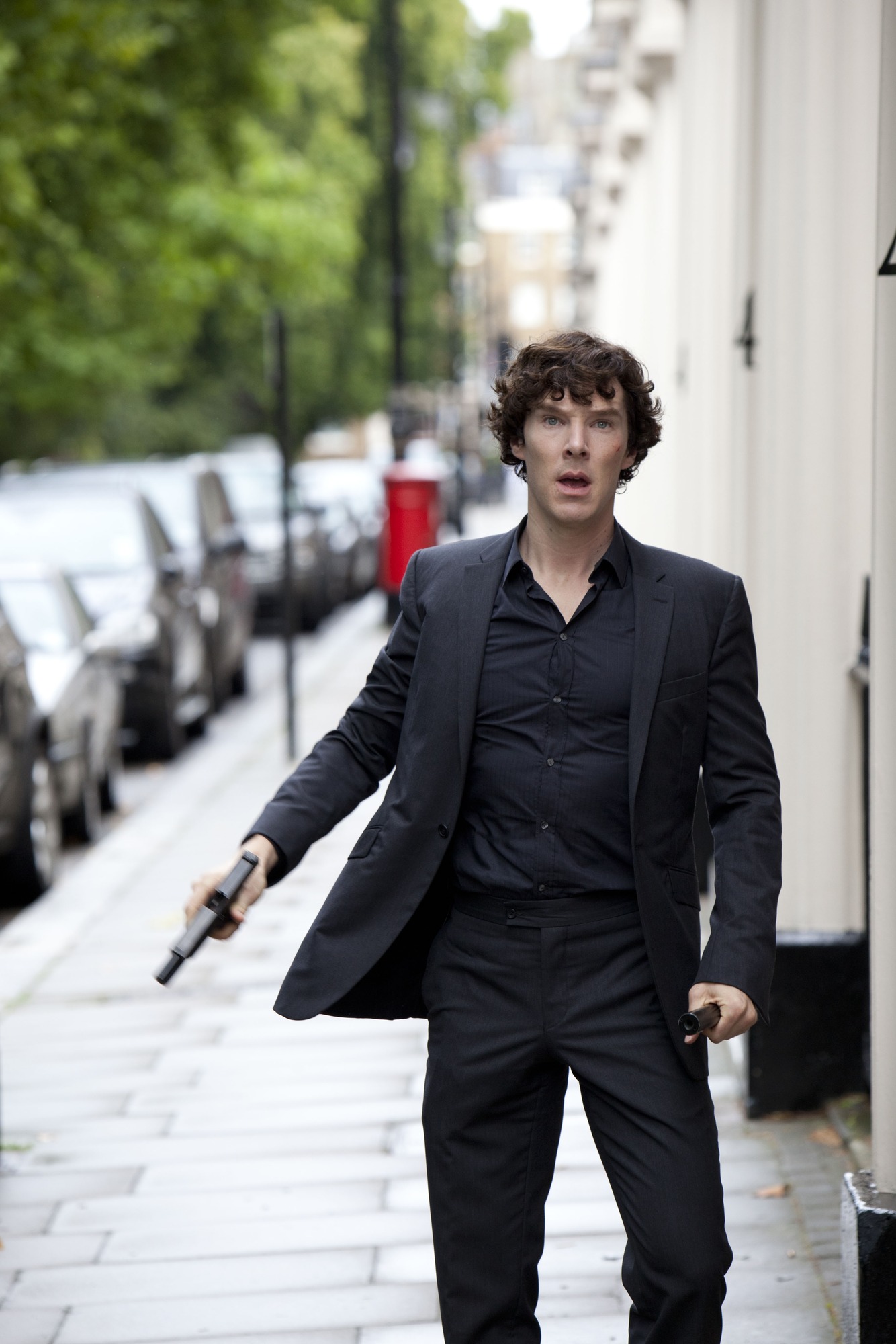Sherlock, Series 2, BBC One | reviews, news & interviews
Sherlock, Series 2, BBC One
Sherlock, Series 2, BBC One
The rebooted net 'tec returns in a stylish and sexy game of wits

My, but it’s been a bumper few months for the Baker Street Boy. There’s been Anthony Horowitz’s superior new Holmes novel, The House of Silk, Guy Ritchie’s second instalment of his steampunk take on Sherlock as karate-kicking action hero, and now the return of the BBC’s stylish reboot of Holmes as a new millennium net 'tec. And what a lot of fun it was.
The first of three new 90-minute films began where the last series left off, reviewing the stand-off between Holmes ( Benedict Cumberbatch) and Watson (Martin Freeman) and the psychopathic “consulting criminal” Jim Moriarty (Andrew Scott, whose resemblance to Dec from Ant & Dec only slightly dulled his see-sawing menace).
 It proved to be the last we saw of Holmes’s arch-rival until very near the end of this episode, though he cast a long shadow. Entitled A Scandal in Belgravia, the plot stuck surprisely close to the broad outline of A Scandal in Bohemia, one of Conan Doyle’s raciest tales. The Bohemian Grand Duke of Cassel-Felstein in the original story had become a (female) member of the British royal family, snapped in a series of compromising positions with Irene Adler (Lara Pulver, pictured left), recast as a high-end dominatrix who, in Mycroft’s peerless phrase, provided “recreational scolding” to the rich and powerful. Considerably cooler and smarter than Holmes's estimation of the average female of the species, Adler had made the royals aware of the existence of the slap-happy snaps and Holmes was duly employed to get them back. And so the game was afoot. A game of equals. Almost.
It proved to be the last we saw of Holmes’s arch-rival until very near the end of this episode, though he cast a long shadow. Entitled A Scandal in Belgravia, the plot stuck surprisely close to the broad outline of A Scandal in Bohemia, one of Conan Doyle’s raciest tales. The Bohemian Grand Duke of Cassel-Felstein in the original story had become a (female) member of the British royal family, snapped in a series of compromising positions with Irene Adler (Lara Pulver, pictured left), recast as a high-end dominatrix who, in Mycroft’s peerless phrase, provided “recreational scolding” to the rich and powerful. Considerably cooler and smarter than Holmes's estimation of the average female of the species, Adler had made the royals aware of the existence of the slap-happy snaps and Holmes was duly employed to get them back. And so the game was afoot. A game of equals. Almost.
The plot – taking the original spirit of the Holmes stories and going hell-for-leather – was confused, convoluted nonsense, like one of those head-spinning Ted Rogers riddles that would eventually lead to Dusty Bin. It encompassed the mysterious murder (by boomerang, it transpired) of a man in a remote hillside, several set-tos with US spooks, a faked death, bluffs and double-bluffs, after all of which it became clear that the spanking of the royal rear (which put quite another spin on the phrase blue blood) was a red herring, diverting attention from a more sinister terrorist plot to blow up a jumbo jet. While whipping some high-ranking civil servant into a frenzy Adler had captured on her camera phone vital information pertaining to the plot, and, using her womanly wiles, later snared Holmes into deciphering the clue. She then fed the info straight to Moriarty, who informed the terrorist cells – and well, yes, it all eventually got more than a little silly.
But 'twas ever thus with Holmes. Sherlock was overlong and eventually ran out of puff, but it was successful utimately not because of the tale itself but for the stylish and entertaining manner in which it was told. Cumberbatch (pictured below right) is a joy, bringing a marvellously jaded wit to Holmes, while Freeman quietly excels as his deadpan cohort. Together they enjoy a terrific rapport, capturing the odd bond shared by the pair. They were well served in A Scandal in Belgravia by Steven Moffat’s whip-smart script, which gave them both killer lines while also dishing up winking in-jokes (a deerstalker and a blog post called "The Speckled Blond" among them), and which was altogether fast, funny, clever and literate. Paul McGuigan’s direction, meanwhile, was endlessly inventive, doing its utmost to keep pace with the squealing handbrake turns of Holmes’s mind.
 There was sport to be had with the royal connections. Holmes pitched up in Buck House having been dragged from his manky flat (when Una Stubbs’s Mrs Hudson opened the fridge she picked up something in a plastic bag and yelped, “Oh dear, thumbs!”) wearing only a bed sheet. “We are in Buckingham Palace, the very heart of the British nation,” growled brother Mycroft, played with a lovely upper-crust ennui by the show’s executive producer Mark Gatiss, “Sherlock Holmes, put your trousers on.” Cue much schoolyard giggling from Holmes and Watson.
There was sport to be had with the royal connections. Holmes pitched up in Buck House having been dragged from his manky flat (when Una Stubbs’s Mrs Hudson opened the fridge she picked up something in a plastic bag and yelped, “Oh dear, thumbs!”) wearing only a bed sheet. “We are in Buckingham Palace, the very heart of the British nation,” growled brother Mycroft, played with a lovely upper-crust ennui by the show’s executive producer Mark Gatiss, “Sherlock Holmes, put your trousers on.” Cue much schoolyard giggling from Holmes and Watson.
Cumberbatch and Pulver, meanwhile, had a whale of a time making brainy the new sexy (although both were more than adept in the "making sexy the new sexy" department, too). The episode could have been subtitled The Sexing of Sherlock. Adler was, famously, the closest Holmes ever came to being bested by a woman; indeed, he ever after referred to her as “the woman”.
You could see why. She made a memorable entrance wearing nothing but a predatory smirk, and for a while it looked as though Holmes, snared in an erotically charged game of cat-and-mouse, had for once had his interest engaged somewhere due south of his brain. But not so fast. This, it transpired, was the kind of man who takes a woman’s pulse when she’s propositioning him in order to dust for any traces of that most deadly emotion, sentiment.
For in the end the winner in this grand game of wits was determined not by the criminal ending up in the arms of Inspector Lestrade, but rather with the reveal that one of the pair had been playing for genuine emotional stakes. Not only her quickening heartbeat but also the crucial codeword protecting the secrets in her camera phone revealed Adler's passion for the detective. Thus, she lost. Holmes too, however, displayed signs of a hot heart beating hard somewhere beyond the freeze-chilled brain. And that tell-tale code? It read: I AM SHERLOCKED. You could kind of see where she was, um, coming from.
Share this article
Add comment
The future of Arts Journalism
You can stop theartsdesk.com closing!
We urgently need financing to survive. Our fundraising drive has thus far raised £49,000 but we need to reach £100,000 or we will be forced to close. Please contribute here: https://gofund.me/c3f6033d
And if you can forward this information to anyone who might assist, we’d be grateful.

Subscribe to theartsdesk.com
Thank you for continuing to read our work on theartsdesk.com. For unlimited access to every article in its entirety, including our archive of more than 15,000 pieces, we're asking for £5 per month or £40 per year. We feel it's a very good deal, and hope you do too.
To take a subscription now simply click here.
And if you're looking for that extra gift for a friend or family member, why not treat them to a theartsdesk.com gift subscription?
more TV
 The Diplomat, Season 3, Netflix review - Ambassador Kate Wyler becomes America's Second Lady
Soapy transatlantic political drama keeps the Special Relationship alive
The Diplomat, Season 3, Netflix review - Ambassador Kate Wyler becomes America's Second Lady
Soapy transatlantic political drama keeps the Special Relationship alive
 The Perfect Neighbor, Netflix review - Florida found-footage documentary is a harrowing watch
Sundance winner chronicles a death that should have been prevented
The Perfect Neighbor, Netflix review - Florida found-footage documentary is a harrowing watch
Sundance winner chronicles a death that should have been prevented
 Murder Before Evensong, Acorn TV review - death comes to the picturesque village of Champton
The Rev Richard Coles's sleuthing cleric hits the screen
Murder Before Evensong, Acorn TV review - death comes to the picturesque village of Champton
The Rev Richard Coles's sleuthing cleric hits the screen
 Black Rabbit, Netflix review - grime and punishment in New York City
Jude Law and Jason Bateman tread the thin line between love and hate
Black Rabbit, Netflix review - grime and punishment in New York City
Jude Law and Jason Bateman tread the thin line between love and hate
 The Hack, ITV review - plodding anatomy of twin UK scandals
Jack Thorne's skill can't disguise the bagginess of his double-headed material
The Hack, ITV review - plodding anatomy of twin UK scandals
Jack Thorne's skill can't disguise the bagginess of his double-headed material
 Slow Horses, Series 5, Apple TV+ review - terror, trauma and impeccable comic timing
Jackson Lamb's band of MI5 misfits continues to fascinate and amuse
Slow Horses, Series 5, Apple TV+ review - terror, trauma and impeccable comic timing
Jackson Lamb's band of MI5 misfits continues to fascinate and amuse
 Coldwater, ITV1 review - horror and black comedy in the Highlands
Superb cast lights up David Ireland's cunning thriller
Coldwater, ITV1 review - horror and black comedy in the Highlands
Superb cast lights up David Ireland's cunning thriller
 Blu-ray: The Sweeney - Series One
Influential and entertaining 1970s police drama, handsomely restored
Blu-ray: The Sweeney - Series One
Influential and entertaining 1970s police drama, handsomely restored
 I Fought the Law, ITVX review - how an 800-year-old law was challenged and changed
Sheridan Smith's raw performance dominates ITV's new docudrama about injustice
I Fought the Law, ITVX review - how an 800-year-old law was challenged and changed
Sheridan Smith's raw performance dominates ITV's new docudrama about injustice
 The Paper, Sky Max review - a spinoff of the US Office worth waiting 20 years for
Perfectly judged recycling of the original's key elements, with a star turn at its heart
The Paper, Sky Max review - a spinoff of the US Office worth waiting 20 years for
Perfectly judged recycling of the original's key elements, with a star turn at its heart
 The Guest, BBC One review - be careful what you wish for
A terrific Eve Myles stars in addictive Welsh mystery
The Guest, BBC One review - be careful what you wish for
A terrific Eve Myles stars in addictive Welsh mystery
 theartsdesk Q&A: Suranne Jones on 'Hostage', power pants and politics
The star and producer talks about taking on the role of Prime Minister, wearing high heels and living in the public eye
theartsdesk Q&A: Suranne Jones on 'Hostage', power pants and politics
The star and producer talks about taking on the role of Prime Minister, wearing high heels and living in the public eye

Comments
A very stylish and
Oh, for fuck's sake... spare
BeeJeezus - your email is
Mark you just made me yawn.
Your review hit the nail on
Well, color me quite
Harsh words. I'm afraid i
Nice write up! I found a
In my humble opinion this is
If you don't rate it stop
Does anyone know what the
It took me ages to find but I
first of all u didn't know